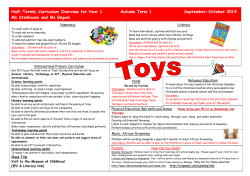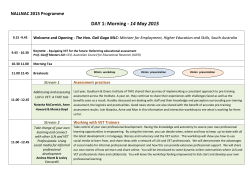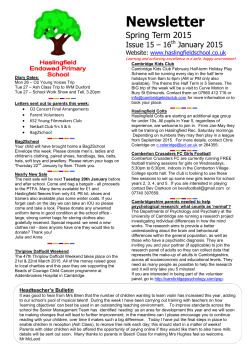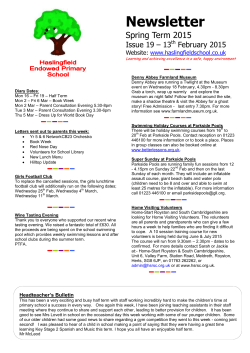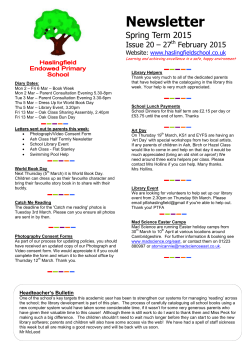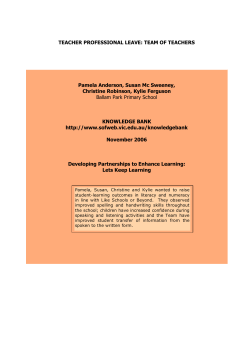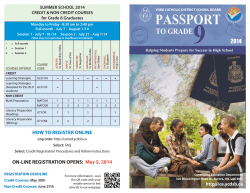
DAY 1: Morning - 14 May 2015 - Australian Council for Educational
NALLNAC 2015 Programme DAY 1: Morning - 14 May 2015 9.15 -9.45 9.45 - 10.30 Welcome and Opening - The Hon. Gail Gago MLC: Minister for Employment, Higher Education and Skills, South Australia Keynote - Equipping VET for the future: Reforming educational assessment Prof. Geoff Masters AO: CEO, Australian Council for Educational Research (ACER) 10.30 11.00 Morning Tea 11.00 12.45 Breakouts Stream 1 11.00 -12.45 90min workshop 45min presentation 45min presentation Assessment practices Addressing and assessing LLN in VET: A TAFE tale TBC Natasha McCormick, Anne Munday & Monica Boyd Stream 2 11.00 -12.45 Take charge of your own learning and connect with other LLN and VET Professionals: Using social media for informal professional development.” Andrea Rivett & Lesley Cioccarelli Working with VET Trainers Take control of your own professional development. Having the knowledge and autonomy to source your own professional learning opportunities is empowering. By using the internet, you can decide when, where and how to keep up-to-date with all the latest development s in language, literacy and numeracy and the VET sector. This workshop will show you how to use social media to learn from, and share ideas with a network of LLN and VET professionals. We will demonstrate the advantages of social media for informal professional development and how this can provide extensive professional support. We will share our own stories of how we learn and share online. You will be introduced to some dynamic online communities where LLN and VET professionals share and collaborate. You will leave the workshop feeling empowered to kick start and develop your own professional learning. 11.00 -12.45 Stream 3 TBC Stream 4 11.00 -11.45 Youth programs The Journey Begins... Ann Bolton & Megan Gaskett Adult programs The journey from vision through to planning and then the implementation of a traditionally face to face nurse education experience into a digital platform relevant across the country. This session will be presented in a timeline from inception to birth of a new way of learning and teaching nursing. A case study – South Western Sydney Institute of TAFE (SWSi) Who is studying what Online? This session will discuss Online learning in two adult contexts. The first group are adult LLN learners in 10749 Certificate II in Foundation Language Skills and the second group are VET trainers in the Certificate IV upgrade with TAELLN411 Address Adult Language, Literacy and Numeracy Skills. 12.00 -12.45 Adult learners and teachers as learners in an What are their experiences? online context. Llewella Cobbin & Anna Francis This session will present findings, learner success stories, challenges and conclusions. It will address the multiple factors affecting all learners who undertake online learning. It will demonstrate that trainers as learners fit amongst all learner profiles. What does this mean for Online learning in the future? These Online experiences have contributed specifically to development of the Online Graduate Diploma of Adult Language Literacy and Numeracy Practice (TAE80113) which will be delivered by SWSi in 2015. This session will conclude with reflective implications and recommendations for future online course creation. Stream 5 Research Building the capacity of those who deliver foundation skills is a key component of the National Foundation Skills Strategy for Adults. Work has been underway as part of the National Foundation Skills Strategy Project to ‘Identify and Qualify Professional Practice in Foundation Skills.’ 11.00 - 11.45 So who is delivering foundation skills? Michelle Circelli & Louise Wignall Two inter-related activities have been used to learn more about the practitioners who deliver foundation skills across Australia. A survey carried out by NCVER in 2014 provides fresh national data about the diverse range of practitioners who are teaching or helping people develop their foundation skills, either in a paid or voluntary capacity across Australia. ‘Stories from the Field’ is a collection of narratives gathered from practitioners that give us a clearer understanding of the range of credentials, experience and professional development approaches that contribute to the professional identity of practitioners currently delivering foundation skills. Together these activities provide a rich data set that not only tell us about the skills and expertise practitioners bring to their work, but the skills and professional development needed to continue to deliver the right mix of skills to learners to help them meet the challenges of living, learning and working in Australia now and into the future. This session will report on the findings from both the survey and practitioner narratives. 12.00 -12.45 TBC Stream 6 11.00 -12.45 Strengthening the N in LLN - why addressing numeracy skills is crucial Dave Tout 12.45- 1.30 Lunch and exhibition Policy and programs This presentation will highlight a number of critical issues related to maths and numeracy in work and the implications for education and workplaces. What are the challenges we face in improving the ability of workers and learners to understand, use and apply maths in their lives, and how might we better address this in our teaching and training practices? Based on knowledge and research about youth and adults’ skills in numeracy, about maths and numeracy at work and about the teaching and learning of maths and numeracy, this presentation will argue why it is essential to explicitly address the numeracy competence of both young people and adults and why strengthening the N in LLN should be given much higher priority. The session will also illustrate and discuss a number of different issues that need to be addressed regarding teaching numeracy, and suitable activities for VET and workplace trainers to integrate into their teaching. DAY 1: Afternoon - 14 May 2015 1.30- 2.45 Keynote - Learning, Earning and Yearning: Indigenous learners, LLN, and VET success - from theory to practice Ros Bauer: Adult Literacy Services, Australian Training Awards Winner – Excellence in Adult Language Literacy Numeracy Practice Tony Dreise: Principal Research Fellow, Educational Monitoring and Research, Education Policy and Practice Indigenous Education, ACER Breakouts - Stream 1 2.45 4.30 Top Down, Bottom Up: better understanding the learner by using a variety of assessment types Jim Spithill & Philippa McLean Stream 2 90min workshop 45min presentation 45min presentation Assessment practices A theme for NALNAC 2015 is understanding the uniqueness of each learner's background, current circumstances and future ambitions. Any VET provider will have in place a set of procedures and assessment processes that apply to all applicants, prescribed in a 'top down' way. This session will discuss some of the pros and cons of such generic online or paper-based assessments. As well, a VET provider will want to understand and respond in a 'bottom up' way to the special circumstances of each individual, perhaps using one-on-one interviews, which also have their pros and cons. The key requirement is that the suite of assessments must reliably inform the subsequent learning sequence. This session will examine how best to write and review assessment items in Numeracy, Listening and Reading, following guidelines developed at ACER and being implemented in the new FSAT tool. Working with VET Trainers How do we move beyond the focus on literacy and numeracy compliance and into learning? 2.45 - 3.30 Joining the Dots Koula Lykourinos Koula Lykourinos will outline how Melbourne Polytechnic uses the results of an initial literacy and numeracy (LN) assessment to implement LN support in order to improve students retention, learning and outcomes. She will look at how Melbourne Polytechnic builds LN capacity in the VET sector by working with VET teachers to design delivery and assessment materials and content. This is an interactive workshop where participants will be given opportunities to discuss their own ideas and practices. 3.45 - 4.30 2.45 4.30 Embedding LLN in VET Training Panel discussion with: Jen Zhao, Linda Are (More speakers TBC) Stream 3 The main purpose of the proposed session is to share the knowledge and experiences gained by lecturers who have worked in the TAFESA Applied Learning Model delivery in partnership with VET trainers in TAFESA. The panel of four will include LLN lecturers and VET trainer(s) to inform the audience of the delivery methodology and outcomes from the different perspectives. This model has been operating since 2012 and the presenters will share their stories. Youth programs When you talk about someone being ‘work ready’ what do you mean? Do employers teachers, trainers, parents and young people themselves all have the same idea about what ‘work readiness ‘ involves – and, if not, does it matter? Work Readiness: What is it Until recently, there has been no common language for pinning down what ‘work readiness’ really is, few tools for really? Kate Perkins & Sue Goodwin Stream 4 identifying the particular skills and knowledge involved, and no agreed way of tracking, assessing and providing useful feedback on progress. This interactive session introduces evidence-based models and tools that have the potential, not only to provide a way out of the endless debates around the subject, but to support young people to develop the skills and knowledge they need to make their entry into employment a positive and valued experience for all concerned. Adult programs People with low levels of literacy are over-represented amongst the incarcerated and yet literacy programs to support adults in custodial settings have not typically drawn on the knowledge-base of speech pathologists. Evidence-based practices of intensive direct-instruction in phonological processing, synthetic phonics and oral and written language are not routinely applied for those vulnerable clients who have failed to respond to generic adult literacy interventions. 2.45 - 3.30 Just Sentences: A phonological processing and language perspective in the literacy programs of two inmates at Tasmania's Risdon Prison Rosalie Martin 3.45 - 4.30 Numeracy By Measure: Building the workplace measurement skills of VET practitioners Tina Berghella Just Sentences piloted direct-instruction in phonological awareness and synthetic phonics within a meta-linguistic framework, in the literacy programs of two inmates. These interventions were delivered primarily by a speech pathologist – with extra practice delivered by the prison-based literacy coordinator. Both subjects achieved the excellent gains which the literature predicts and the program simultaneously demonstrated this powerful methodology to the adult literacy staff working within the prison-based literacy program. Just Sentences provided a locally-contextualised experience of bringing the speech pathologist’s specialised skills to a vulnerable group requiring support within the deeply complex system of a prison. Relationship and goodwill have been established for scoping pathways by which such evidence-based practice can be both expanded and embedded for those inmates of Risdon Prison for whom it would bring benefit – valuing human dignity and as yet unquantified community costbenefit. Low numeracy skills limit labour participation, wage levels and workplace productivity. All workers across all jobs in all industries need numeracy skills, and in particular, measurement skills. Measurement underpins the success and welfare of a modern workplace and touches almost every part of working life. This is a hands-on workshop where participants will focus on examples of real job tasks that require measurement skills. We will identify the numeracy skills demands, unpack them using the ACSF numeracy indicators and determine the ACSF numeracy level of the job tasks. The workshop is related to recently published, WELL funded, professional development resource, Numeracy by Measure, developed by Tina Berghella and David Tout. Stream 5 2.45 - 3.30 The return on investing in LLN in industry Justin Brown & Michael Taylor 3.45 - 4.30 How Aussies went: some lessons from Australia's PIAAC results Dave Tout & Juliette Mendelovits Stream 6 2.45 - 4.30 Appreciating the value of language, literacy and numeracy training. Michelle Ingley-Smith & Jenni Oldfield 4.30 - 5.30 Panel: TBC 5.30 - 7.30 Networking Event Research This paper presents the results of a research project which investigated the returns to employers from investing in workplace literacy training. With support from the Commonwealth Government, it was commissioned by the Australian Industry Group to develop and trial a set of return on investment (ROI) instruments for wider application by employers and program evaluators in the future. Drawing on an extensive literature review and mapping of current practice, the case study results provide new insights into the relationship between workplace literacy training; estimate the financial returns to employers from their investment; and offer a new framework for evaluating workplace literacy programs in the future. Drawing on the experiences of a range of different industry sectors, the results have significant implications for future policy, practice and research. For the first time, hear about how Australian adults performed on the reading and numeracy questions in the assessment as part of PIAAC - the OECD's international assessment of adults' literacy and numeracy skills. What percentages of Australians were able to answer particular questions. What types of questions did we do well on compared with other countries? What types of question did we struggle with? The presenters were both involved in the development of PIAAC and now have been able to analyse and interpret some of the Australian data. Come along and hear about their first analysis of the performance data. Policy and programs In 2012 ForestWorks received WELL Strategic Funding to build awareness of the LLN skills gaps that exist in the forest and forest products industry and their ongoing effect on business productivity and development. Further, the goal is to build strategies to address these skills as an integral part to what is called ‘innovation skills’ or ‘skills for greater businesses’. These skills also include leadership skills, teamwork skills, creative and critical thinking, problem solving, personal skills and skills to implement organisational policies, workplace health and safety policies, environmentally sustainable work practices. As part of the project, ForestWorks have developed an online hub, packed with examples of typical LLN skill gaps that exist in workplaces, how those skill issues affected the workplace, and the solutions that workplaces put in place to build the LLN skills required for effective work. The hub includes sample activities and resources that can be used in various settings. Come along and take a look at how it works and what’s included!
© Copyright 2025

